2021 “Food & Wellness Future Forum”
December 6, 2021
2nd Food & Wellness Future Forum: “Toward a Rich and Sustainable Diet–Let’s Discuss Food Additives”
Ajinomoto Co., Inc. held the 2nd Food & Wellness Future Forum on Wednesday, September 1st. The online event’s aims were to promote communication around food and health issues, ensuring everyone has access to accurate knowledge and information, and to contribute to the creation of an affluent society in which people can live with peace of mind while deepening mutual understanding.
Entitled “Toward a Rich and Sustainable Diet—Let’s Discuss Food Additives,” this year’s event featured a panel of experts from various fields and drew an online audience of more than 2,700 viewers. Using instant real-time polling and live chat, participants shared their thoughts and concerns about the safety and value of food additives and the importance of access to objective information. Over 3,000 opinions were received during the chat, indicating the high level of interest around food additives and food safety.
Opening Remarks
Deepening the discussion around food additives through public dialogue
Faced with a wide variety of issues related to food and wellness and how to address them, this year we have once again chosen to make food additives our theme for this event.
A survey taken after last year’s forum showed that just over 10% of participants had positively changed their views on food additives. However, more than 30% of respondents still had concerns about their safety. Therefore, as the event organizer, I wanted to return again to the subject of food additives this year, to deepen our understanding together by discussing the reasons behind these concerns, as well as the safety and value of food additives. To further foster dialogue, this year we have made it possible for everyone to participate via live chat. I hope that by the end of this forum, all of your concerns will have been addressed and that your dietary habits will be enriched.
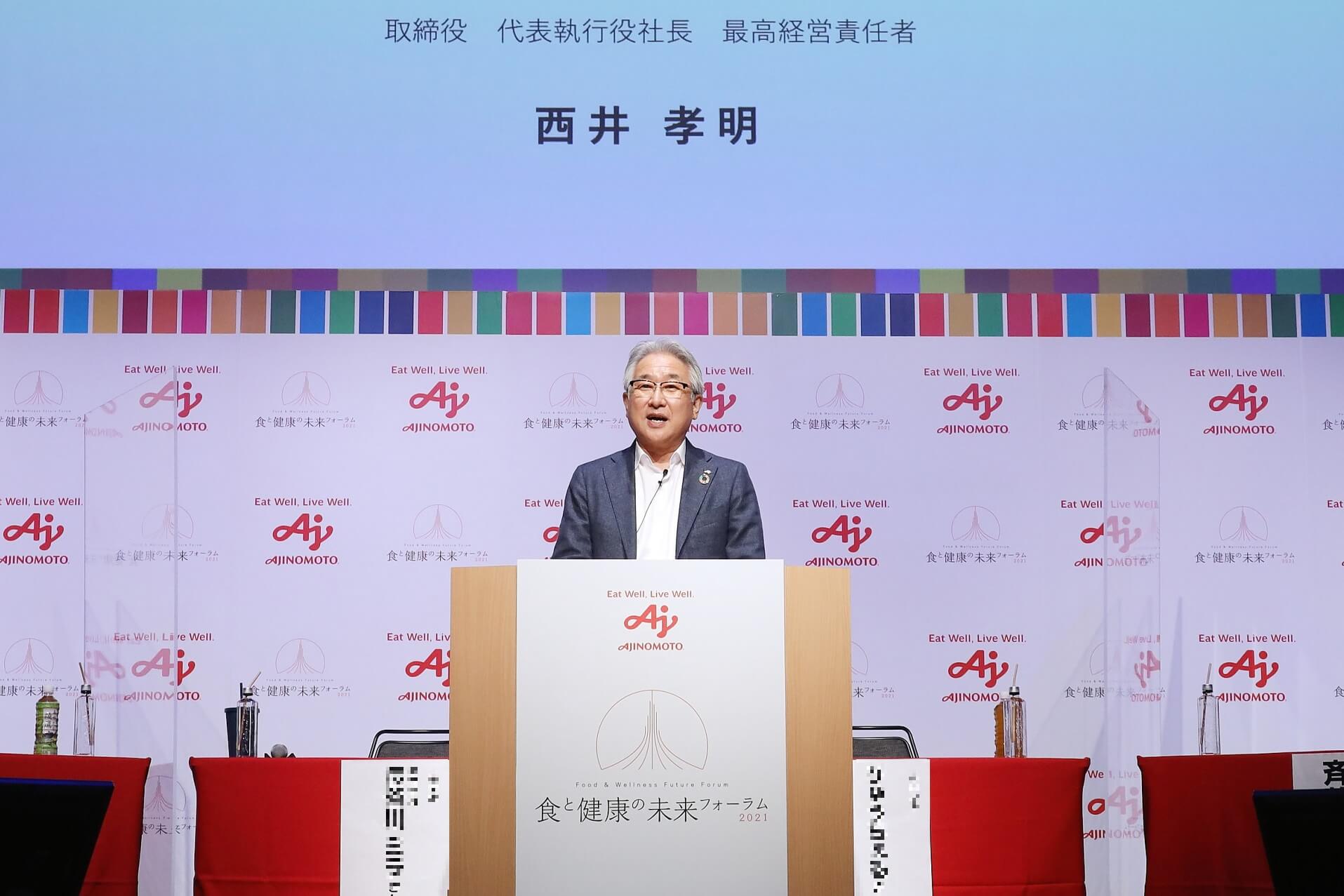
Takaaki Nishii
Director, President, and Chief Executive Officer
Ajinomoto Co., Inc.
Part One Where do concerns over food additives come from?
Kenichi Shimomura: First, let’s take another look at last year’s survey. After the event, about 14% of respondents changed their minds about the safety of food additives, saying they had been concerned before the forum but concluded afterward that additives were safe. On the other hand, 22% of respondents said that while they understood the issue of safety, they still had some concerns, and 12% said they still had questions about the issue of safety itself.
Furthermore, in regard to the labeling of food additives, even after the event 25% of respondents said they would purchase products labeled “additive-free” or “no additives used.”
Real-time viewer poll at the start of the event
Question #1: How much do you know about food additives? (n=704)
I understand the uses and function of the most common food additives: 42.5%
I’m familiar with terms such as “preservatives,” “antioxidants,” etc.: 46.7%
I don’t know much about food additives: 10.8%
Question #2: Do you have concerns about food additives? (n=713)
Have some concerns: 44.2%
No opinion: 29.6%
Have no concerns:26.2%
Some of the live chat comments received:
Don’t additives accumulate in the body?
Aren’t they listed on food labels because they’re harmful?
Why is the amount of additives allowed in foods regulated?
Topic #1: What are food additives in the first place?
Food additives are essential for making processed foods
They are in the foods we eat every day that enrich our lives
Shimomura: According to last year’s survey, one of the reasons for the concern over food additives was that people didn’t understand what food additives were to begin with.
Shimomura: According to last year’s survey, one of the reasons for the concern over food additives was that people didn’t understand what food additives were to begin with.
Hideaki Karaki: Food additives are added to foods because they serve a purpose. Pesticides, pollutants, and other contaminants are not food additives. The main purpose of food additives is for making processed foods. Specifically, they have four roles: ① To aid chemically in the manufacture or processing of foods, ② to preserve food quality, ③ to make foods look and taste good, and ④ to increase the nutritional value of foods. Thanks to food additives, we can readily purchase processed foods of a consistent quality at any supermarket or convenience store. Without food additives, most processed foods wouldn’t exist.
Guest ①: We live in an age of convenience. For example, you can buy a bottled drink anywhere, anytime, and processed foods are now indispensable to our daily lives. I don’t want to have to give up these conveniences, but I have some concerns about the safety of food additives.
Topic #2: Where do concerns about food additives come from?
Quantity is key to the safety of food additives
It’s virtually impossible to consume more than the allowable amount in our daily lives
Shimomura: There are some people who worry that the amount of food additives allowed in foods is restricted because they are harmful.
Karaki: For every chemical substance, there is a correlation between quantity and effect (this is called the concept of quantity). While a substance may be harmful when consumed in large quantities, it is perfectly safe in small quantities. For example, drinking too much water, salt, or sugar can have adverse effects on the body. Rather than asking, “Is salt dangerous?” the question we need to examine is “How much salt is safe to consume?” The same is true of food additives. We should only use amounts that are considered safe based on the correlation between quantity and effect.
Guest ①: So if you’re very busy and don’t have time to cook from scratch, and frequently eat processed foods out of convenience, are you saying there’s no chance that you might inadvertently consume too much food additives?
Karaki: Experiments are conducted with food additives to exclude carcinogens or substances that could accumulate in the body, as well as to determine how much is safe to consume, what is called the nontoxic amount. The daily intake allowance is 1/100th of the nontoxic amount. This is an amount that will not harm your health even if you were to consume that much every day for the rest of your life. So it is virtually impossible to inadvertently exceed the daily intake allowance.
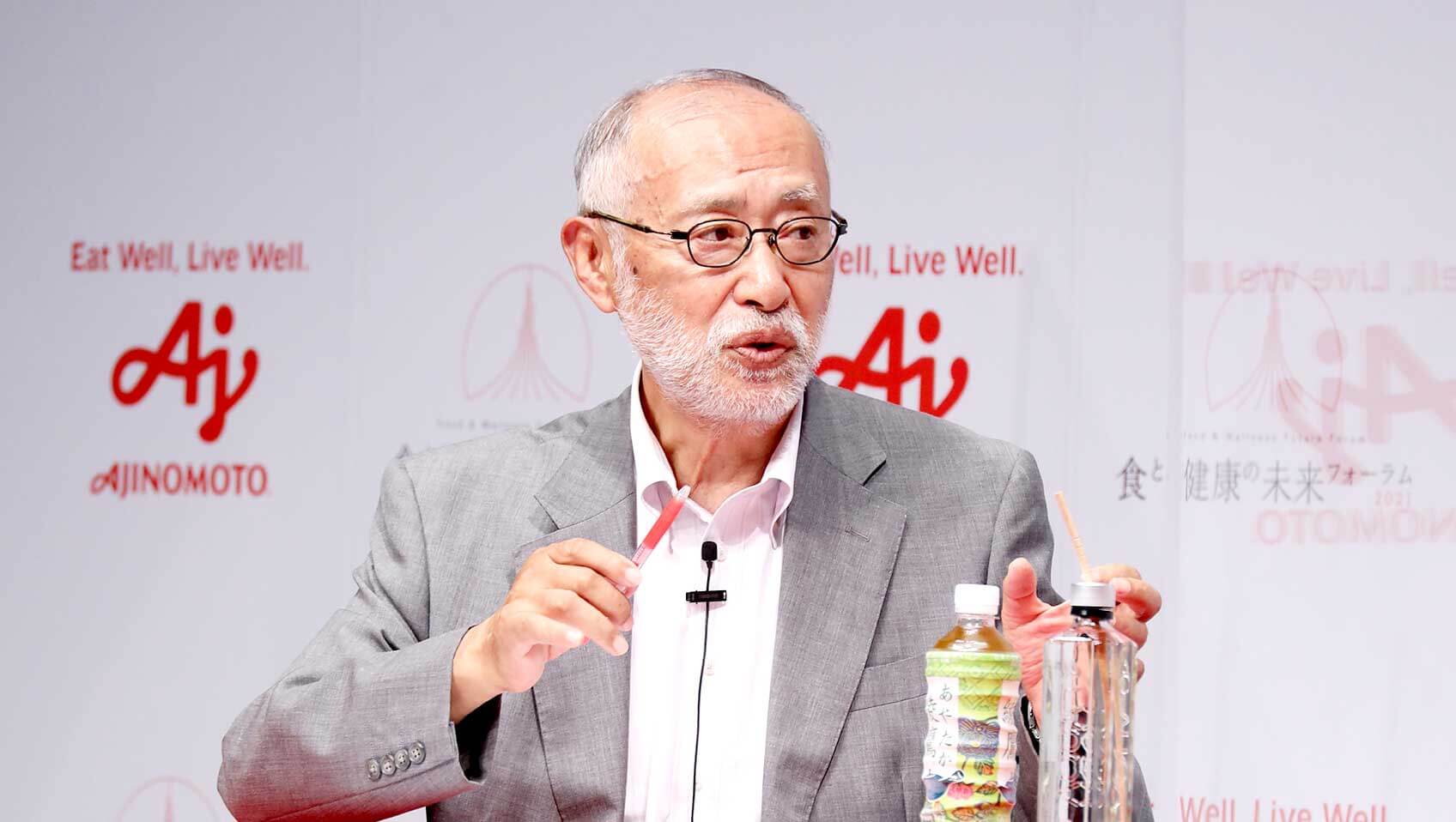
Hideaki Karaki
Professor Emeritus, University of Tokyo
Chairman of the Food Safety and Security Foundation
Food additives are found in many food products, but each one there are standards regulating the quantity of food additives that may be used, so even if you were to consume all of them, you would not exceed your daily intake allowance. In addition, commercial foods are inspected periodically to ensure that these usage standards are being observed by manufacturers. So, there are strict regulations in place to ensure consumers cannot inadvertently consume harmful amounts of food additives. Moreover, the science assures us that even if we were to consume a variety of different food additives in small amounts simultaneously, there would be no adverse effects on our health.
Shimomura: Are these standards the same in each country?
Karaki: Yes, they are practically the same worldwide. This is because foods are distributed globally, so if the standards differed from country to country, it would be impossible to import and export them. Implementation of these standards is overseen by various international bodies. So Japan is not unique by any means.
Guest ①: I heard that in a certain country only 500 different food additives are recognized, while Japan recognizes about 1,500.
Karaki: One reason for this is there are different methods of counting food additives. Depending on the country, substances with similar chemical structures may be counted as a single additive or as separate additives. Some countries treat vitamins and flavorings as food additives, while others regulate them separately from food additives. Rather than just counting the number of food additives, we need to look closely to understand exactly what are being counted as additives in the first place.
Topic #3: Food Additives, COVID-19, and SDGs
Food challenges that emerged from the global pandemic
Food additives contribute to reducing food waste
Shimomura: People have been going out to shop less during the COVID-19 pandemic, ordering groceries online instead, or buying in bulk and storing goods at home. There have also been changes in dietary patterns. What other changes have you noticed, Mr. Saito?
Shunji Saito: More people have been eating meals at home due to the pandemic. Our company has seen an increase in sales of frozen convenience foods, as well as single-serving portions of prepared vegetables. In addition, there has been strong demand for so-called indulgence items such as sweets and premium onigiri rice balls.
These are some of the more noticeable consumer trends.
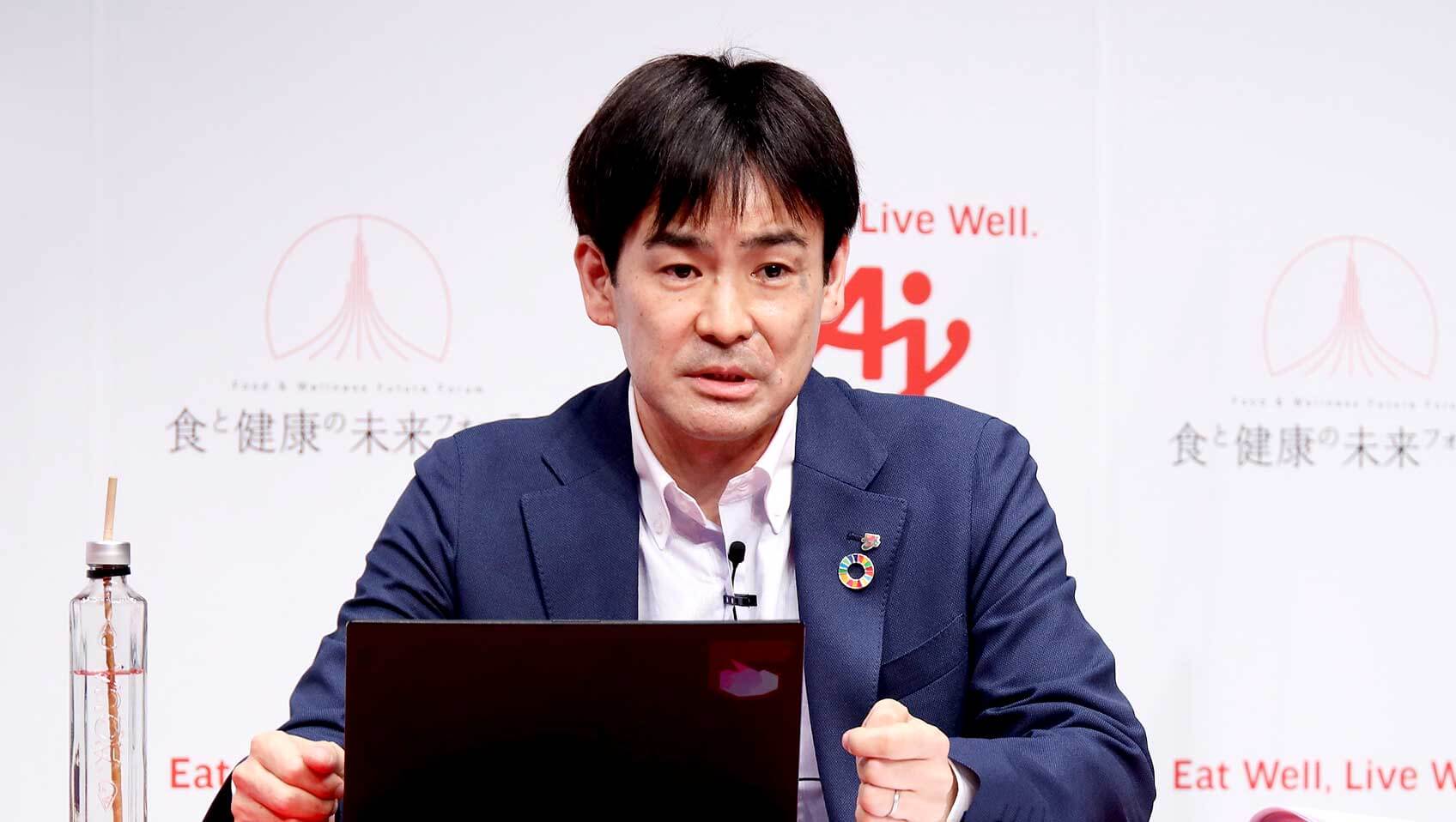
Shunji Saito
General Manager, QC Department
QC & Logistics Management Division
Seven-Eleven Japan Co., Ltd.
Nishii: I also think that with fewer opportunities to go outdoors, people are becoming more health conscious, for example, by avoiding high-salt foods or choosing low-calorie items to make up for lack of exercise. I also have the impression that because people are eating more at home, they’re increasingly concerned about throwing away leftovers and other food.
Shimomura: Speaking of leftovers, this is directly connected to the issue of food loss and food waste. In Japan, 6.12 million tons of food are thrown away every year. Does Seven-Eleven Japan have any initiatives related to food additives for addressing the problem of food waste, Mr. Saito?
Saito: Since 2009, we’ve been working to extend the shelf life of our fresh food offerings with the goal of throwing away less food when items are past their sell-by date. A typical example is our meal-sized salads. Previously, these salad meals were hand packed; now we use gas flush packaging. This keeps the product fresher longer, resulting in less food waste. The process uses nitrogen and carbon dioxide gas as food additives. They preserve the product’s fresh taste longer, extending its shelf life.
Shimomura: How is Ajinomoto addressing the issue of food waste?
Nishii: We use food additives to develop products that can be enjoyed longer because they retain their taste, aroma, and texture even after they’ve cooled, such as when served in packed lunch boxes or at restaurants.
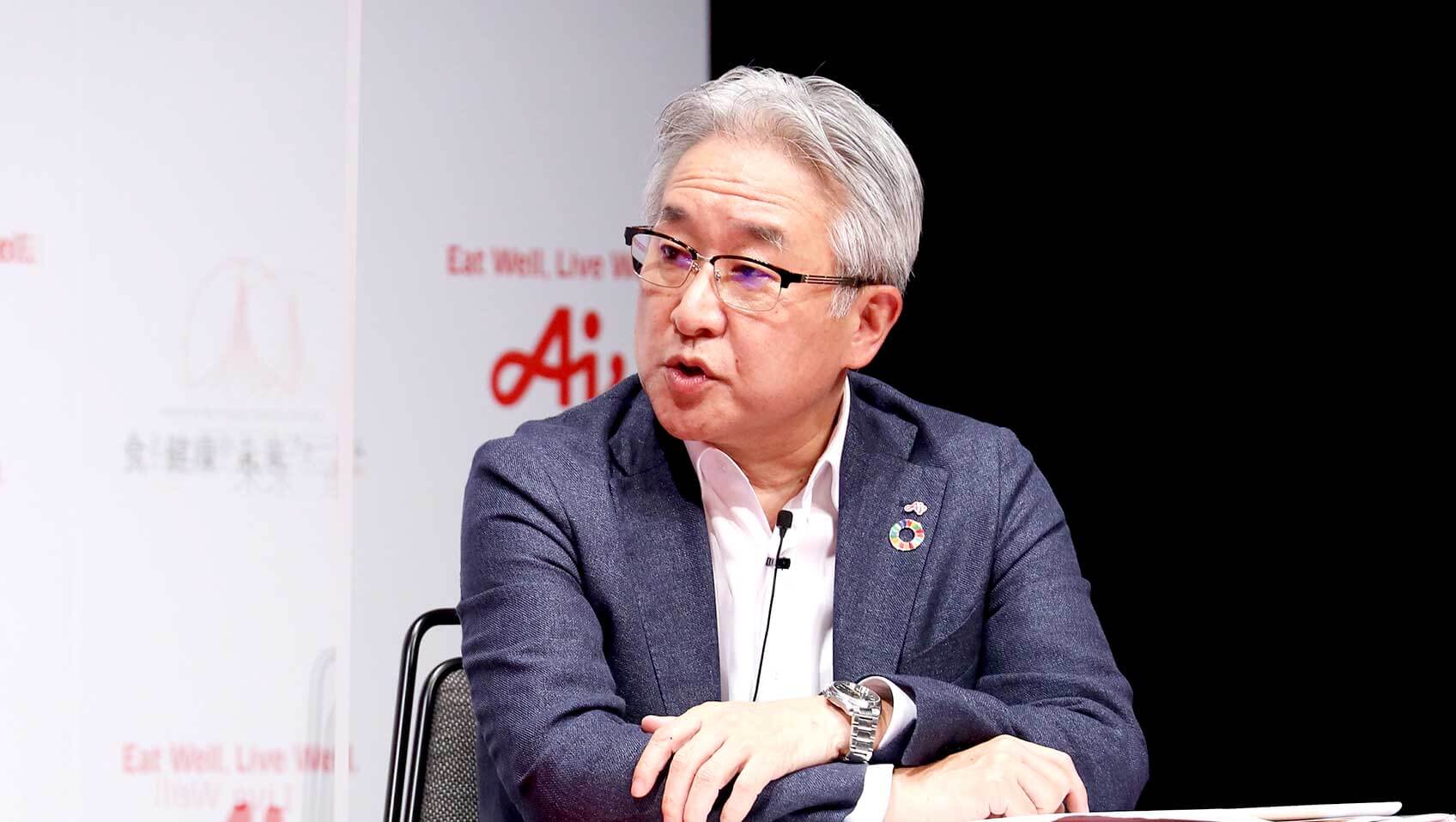
Guest ②: When we shop, we’re voting with our pocketbooks, in the sense that we’re supporting that company’s practices. Before I buy a product, I want to understand where the company stands on food waste, food additives, and other issues.
Shimomura: Yes, shopping is voting! But today, when people vote for food companies, it’s not just based on whether they use food additives, but how and in what ways they’re contributing to society. Moving to the issue of regulation, the Japanese government is apparently considering new rules on food labeling.
Karaki: You’re talking about the Consumer Affairs Agency’s meeting on the labeling of food additives. They already decided to remove the terms “artificial” and “synthetic” from food labeling, as these have contributed to consumer misunderstanding around food additives. Moreover, due to all the information circulating about additives being harmful, concerned consumers gravitate toward products labeled “additive-free.” But most products labeled “additive-free” actually contain food additives, apart from one or two that are misunderstood by consumers. So now the Consumer Affairs Agency is discussing new guidelines to ensure that labels such as “additive-free” and “no additives used” do not contribute to consumer misunderstanding.
Saito: As a food distribution company, Seven-Eleven Japan is participating in these discussions. To avoid consumer misunderstanding, we’ve decided to eliminate labeling such as “contains no preservatives or synthetic coloring,” and we are now communicating our food safety and security practices through our company website.
Professionals talk about the value of food additives (video)
Food additives and nursing care–Akemi Kakizaki, The Japan Dietetic Association
Older people can experience loss of appetite and difficulty in swallowing, so it’s important to provide meals adapted to these age-related conditions. For people in nursing homes who have difficulty swallowing, we recommend the use of commercially available liquid foods, and we encourage those who are receiving in-home care to stock up on ready-to-eat packaged foods, dried goods, and other items with a long shelf life. We believe food additives are indispensable to supporting today’s dietary habits.
Food additives and disaster relief–Dr. Ikusuke Hatsukari, Heartful Kawasaki Hospita
Some 20 years ago, when I was conducting disaster-relief efforts with Doctors Without Borders, all we had were dehydrated nutritional meals. Since then, the quality of emergency meals that Japan supplies to disaster-stricken areas has improved dramatically. There’s much more variety, and some of the meals can be rehydrated before serving. My sense is that food additives have made it possible to offer a wide array of nutritious emergency meals.
Some of the live chat comments received:
With the growth of liquid foods, additives are increasingly important for the elderly.
Emergency meals are very important. I’m glad additives are being used for this purpose.
Disasters leave people feeling anxious and depressed. Delicious meals can be a true lifesaver!
Topic #4: Assessing the accuracy of information
Humans are naturally receptive to information about risk
Understanding the information’s source is key
Shimomura: Finally, let’s talk about how to assess information. These days, we tend to believe any information we come across, whether about food additives or something else.
Guest ①: People of our generation tend to believe whatever they see on social media, rather than actively seeking out information on their own. I think if you were to communicate accurate information over social media, it would be much more likely to get through to people of our generation.
Guest ②: Lots of people tend to trust social media more than traditional media, unquestioningly believing fake news and even extreme views. So, if the government and corporations put out accurate information, it would circulate across social media and reach people across different generations.
Saito: Our participation in this forum last year prompted Seven-Eleven Japan to take a much more active approach than before to communicating with our customers and dispelling any concerns they might have, so they can shop with peace of mind. Social media will definitely play a major part in our efforts going forward.
Karaki: Information is crucial to deciding whether food is safe. Most misinformation about food additives is circulated online. Humans are programmed to believe negative information about risk, so as to protect themselves, but we tend to ignore positive messages about safety. To get through to people, we must communicate at least ten times the number of positive messages about safety as there are negative messages about risk. Another thing to remember is that people tend to ignore information unless it comes from a trusted source.
Shimomura: In this respect, acquiring media literacy is also very important, training ourselves to take a critical approach to information and understanding who it’s coming from. For our part, we need to communicate accurate information in plain language so that people will listen. I also feel it’s important to create more forums for discussion such as this.
We’ll conclude today with the same question we asked in our real-time viewer poll at the start of this event: “Do you have concerns about food additives?” At the beginning of today’s forum, 44% of respondents answered that they have some concerns. At the end of Part Two of today’s forum, that figure dropped to 19%, showing a significant change in the attitude of our audience.
Real-time viewer poll at the end of the event:
Question #3: Do you have concerns about food additives? (n=608)
Have some concerns: 19.2%
No opinion: 32.1%
Have no concerns: 48.7%
Guest ①: Today’s discussion has made me want to take a more personal approach to gathering information. It’s up to everyone to decide what to do with information once they have it. We shouldn’t force our personal views and values onto others. Even if you’re adamantly opposed to food additives, you should accept the fact that the person next to you might be okay with consuming food additives.
Guest ②: Some people unquestionably accept messages about food additives being harmful. But others have concerns even after educating themselves on the subject, maybe because they’re a parent, have a different way of thinking about things, or different family values. I didn’t participate in today’s forum to propogate my own opinions. I wanted to hear what others had to say, have a chance to reexamine the issue, and learn about different options. I’d like to keep an open mind about matters related to food, decide for myself what to do with the knowledge I gain, and respect individual diversity rather than forcing my decisions on others.
Karaki: When people have the preconceived notion that food additives are harmful, they develop a psychological bias in favor of information that confirms this preconceived notion because it gives them peace of mind. They increasingly disregard information that contradicts it and become suspicious of those who claim food additives are safe. Everyone, including myself, can fall into this sort of confirmation bias. I would encourage everyone to take in information that challenges your own views and decide what is correct based on the science and the totality of the information available.
Shimomura: Before you can fix something, you first must know what is broken. In that sense, I hope today’s discussion has provided some new insights. Going forward, we also must consider what kind of information we should be communicating based on our respective standpoints.
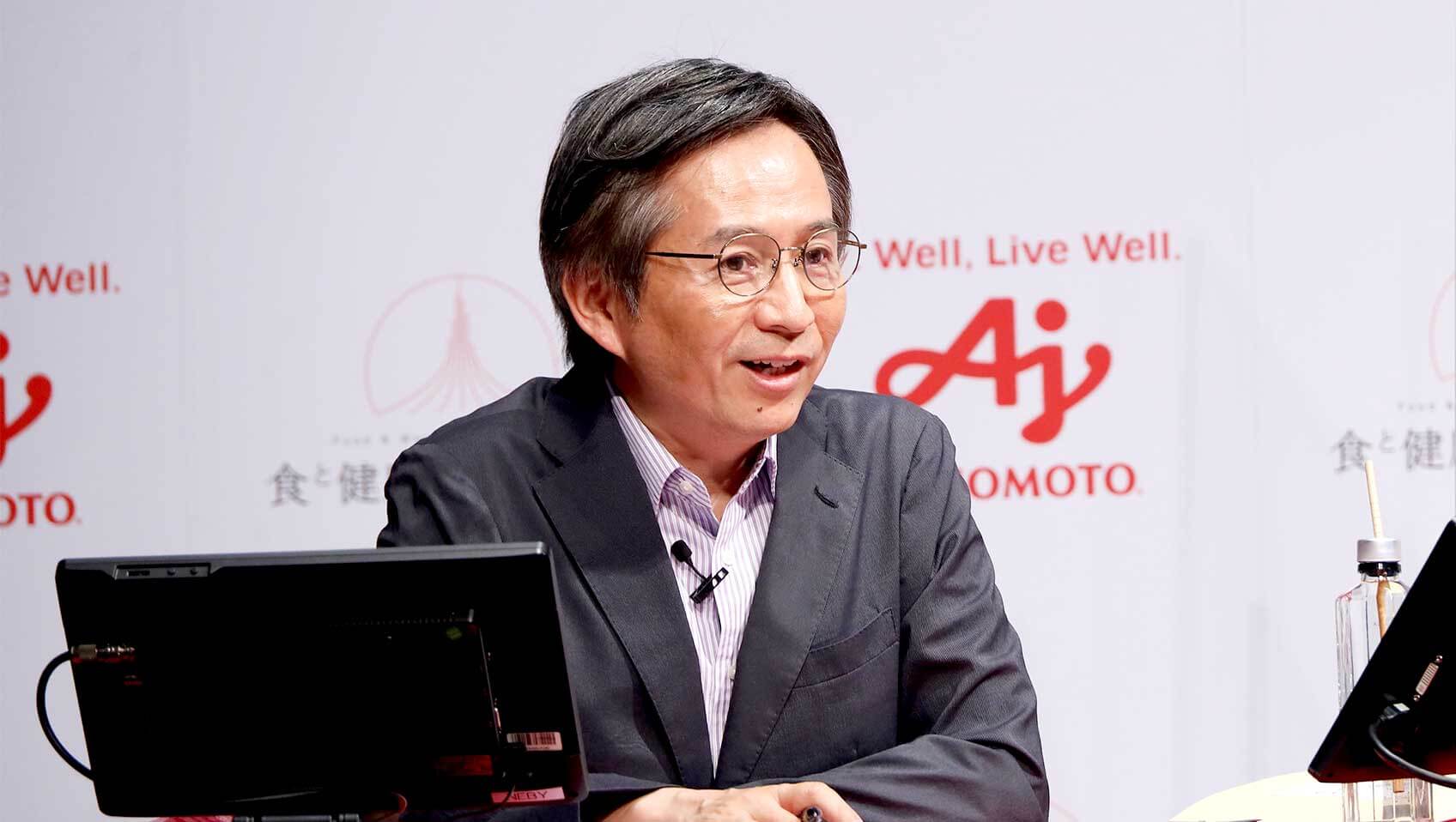
Nishii: I feel we must continue to hold discussions like this involving the general public. In addition to the question of food safety, today we touched on the subject of how food additives are helping, or have the potential to help reduce food waste. But in terms of the future of food, the rise in global warming projected after 2030 and the earth’s growing population mean that this alone may not be enough support our current food system. That’s why I feel that technical innovation will be crucial to achieving a rich and sustainable diet to support longer, healthier lives. I look forward to next year’s Food & Wellness Future Forum as a space for dialogue with as many people as possible.
More than 3,000 opinions, comments, and questions were received continuously via the live chat throughout the two hours that this event lasted, attesting to the high level of audience engagement and the liveliness of the discussion.
Event overview
Name: The 2nd Food & Wellness Future Forum
Title: Toward a Rich and Sustainable Diet—Let’s Discuss Food Additives
Date: September 1, 2021 (Wednesday), 19:00-21:00 JST
Note: This was a live online event
Participants
Moderator: Kenichi Shimomura (Head of the Reiwa Media Research Institute and Chair of the Internet Media Association’s Literacy Subcommittee)
Panelists:
Guest ① (model in the age of 20s)
Guest ② (celebrity in the age of 20s)
Hideaki Karaki (Professor Emeritus, University of Tokyo, Chairman of the Food Safety and Security Foundation)
Shunji Saito (General Manager, QC Department, QC & Logistics Management Division, Seven-Eleven Japan Co., Ltd.)
Takaaki Nishii (Director, President, and Chief Executive Officer, Ajinomoto Co., Inc.)
Note 1: As this was a live event, some of the statements may reflect the participants’ personal opinions or contain ambiguous language.
Note 2: This report is a summary. Some brief supplementary explanations have been added and the order of statements rearranged to improve the flow of the discussion.
